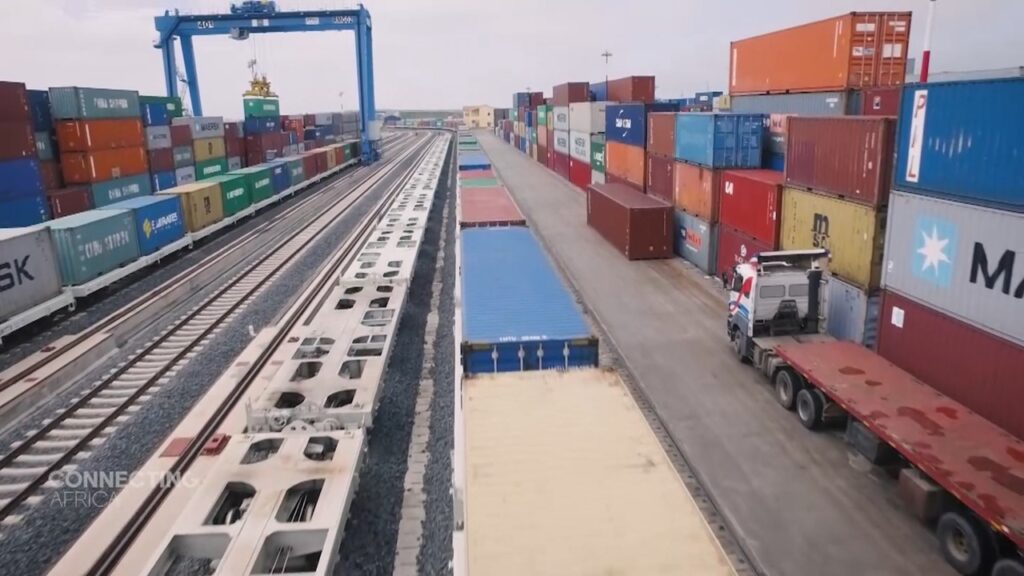How data and technology are Transforming Transport Infrastructure in Africa.

In a region with many landlocked countries, logistics costs can add up to 60% on the consumer price of imported basic commodities
Credits CNN.
CNN International’s Eleni Giokos explores explores how data and technology are transforming transport infrastructure across the continent.
First up, Giokos visits the Kenya Standard Gauge Railway (S-G-R) to see how it is benefitting the import and export industry. Since it was launched in 2017, the S-G-R has moved more than four million tons of cargo along a vital transportation corridor connecting Naivasha and Nairobi with the Port of Mombasa.
Abhishek Sharma, Senior Director of Transport at TradeMark East Africa, tells Giokos how the railway has impacted trade at the port, “Our whole transport system has been realigned. For the longest time, very little cargo was moving by rail, up to 95% of the cargo was moving by road. Suddenly, there has been a massive shift where for containerised cargo from Mombasa to Nairobi 60% of the imports are moving by rail. So, it’s a whole different way in which things are being done.”
In a region with many landlocked countries, logistics costs can add up to 60% on the consumer price of imported basic commodities. Sharma speaks about the positive impact the S-G-R has had on reducing these costs, “Any intervention which reduces the cost of logistics in our region, makes a big difference to what the people in our region can achieve in terms of their health outcomes and educational outcomes, as well as, you know, to be able to save a bit more.”
In the future, the S-G-R project is planned to connect Mombasa to Malaba on the border with Uganda and continue onward to Kampala. It will also run to Kigali in Rwanda, with a branch line to Juba in South Sudan. James Macharia, Kenya’s Cabinet Secretary for Transport, explains the benefits this extension will bring, “Our neighbouring countries will be able to move the cargo from Mombasa all the way to the border, a distance of about 1300 kilometres in a span of about 18 hours. And this is what will bring efficiency and bring competitive advantage to the entire region.”
Next, Giokos meets the co-founder of UgaBus, an online ticketing app enabling travellers within East Africa buy bus tickets. Ronald Hakiza talks about why he launched UgaBus in 2015, “I’ve been to 207 towns in East Africa. I looked at how we struggled to buy tickets in those different towns, and I said to myself, ‘Really? In this era, something should change.’”
The app allows customers to search, compare and book a bus ticket in under three minutes. Christine Kabazira, a UgaBus subscriber, tells the programme why she uses the service, “The hassle that comes with booking buses, going to the bus and the crowds, especially now in the COVID times, the fact that you don’t have to touch money. It confirms that you have paid via SMS and it confirms that you have booked a certain seat. So, all you need to do is just go to the bus station and show them the SMS.”
Currently, passengers can book over 200 routes on the UgaBus app across five countries in East Africa: Kenya, Rwanda, South Sudan, Tanzania, and Uganda, with Zambia being targeted next. Hakiza speaks about the company’s future, “We’re building a bus ecosystem, something that brings together the entire bus online digitally that when you look at the bus, right from luggage, to passenger travel, to ticketing, to experiences, to everything should come online.”
This episode also profiles WhereIsMyTransport, a start-up mapping African cities to provide mobility data and solutions for emerging-market cities, and features GoMetro, a mobile transit information app offering updates to improve the urban commuting experience in South Africa.
Finally, Giokos goes behind the scenes of Sierra Leone’s ferry service Sea Coach Express to find out how they are expanding their routes to neighboring Guinea.





